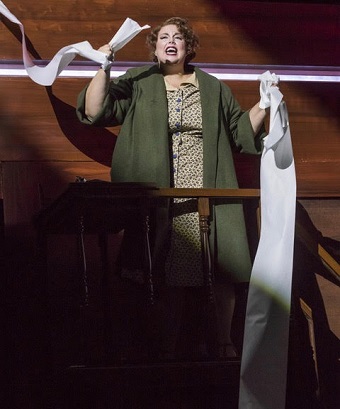 United States 2018 Opera Saratoga Summer Festival [2] – Menotti, The Consul: Soloists and The Opera Saratoga Orchestra / Andrew Bisantz (conductor), Opera Saratoga, The Spa Little Theater, Saratoga Springs, 7.7.2018. (RP)
United States 2018 Opera Saratoga Summer Festival [2] – Menotti, The Consul: Soloists and The Opera Saratoga Orchestra / Andrew Bisantz (conductor), Opera Saratoga, The Spa Little Theater, Saratoga Springs, 7.7.2018. (RP)

© Gary David Gold
Cast:
Magda Sorel – Meghan Kasanders
Mother – Deborah NansteelJohn Sorel – Robert Wesley Mason
The Secretary – Jennifer Panara
The Magician – Tyler Nelson
Secret Police Agent – Nate Mattingly
Vera Boronel – Paulina Villarreal
A Foreign Woman – Kelly Glyptis
Anna Gomez – Ellen Leslie
Mr. Kofner – Garret Obrycki
Assan – Nicholas G. Yaquinto
Plainclothes Policemen – Zachary Barba, Zackery Morris
Production:
Director – Lawrence Edelson
Scenic Designer – Cameron Anderson
Costume Designer – Glenn Avery Breed
Lighting Designer – Brandon Stirling Baker
Wig and Makeup Designer – Sondra Nottingham
There are three reasons that Opera Saratoga’s final performance of Gian Carlo Menotti’s The Consul on 15 July 2018 is a must see. Tragically, the first is that the opera is as timely and relevant now as it was almost 70 years ago when it was composed. Secondly, Lawrence Edelstein’s powerful production is clear and compelling, and he has assembled a team and cast that execute his vision with a fierce commitment to the opera equal to his. Finally, Meghan Kasanders is magnificent, triumphing in the role of Magda Sorel. At the final notes of ‘To this we’ve come’, the theater resounded with cheers and applause.
The Consul was Menotti’s first full-length opera, composed in reaction to his own experience as an immigrant and personal encounters with people fleeing Europe after World War II. Two front page stories in The New York Times also found their way into the opera’s plot. The first detailed the plight of a group of Jewish refugees trying to flee from Austria to Hungary during the war. Paperless and without passports, they were trapped on a bridge between the two countries for a week as neither country would admit them. Then there was the suicide of a Polish immigrant who, when denied entry to the US, hanged herself on Ellis Island.
Menotti has always had his detractors, as has Samuel Barber, his classmate, frequent collaborator and longtime partner. They were deemed Neo-Romantics back when the term was a dig not a compliment. Nevertheless, their music survives. Menotti’s debt to Puccini and other verismo composers is clear: the soaring melodies, the rich orchestrations and the penchant for stories of average people in extraordinary circumstances. He strove for and often achieved the same potent emotional pull that those earlier Italian composers did.
The stage was divided roughly in half between the Sorels’ sparsely furnished apartment and the consulate room where desperate people waited for the piece of paper that would determine their fate. Quick and subtle lighting changes delineated the two spaces. The Secretary, who serves as gatekeeper to the consul, was perched at a desk that could only be reached by a steep set of stairs. She sat behind a typewriter that spewed paper extending to the floor. Paper, the first line of defense for a bureaucracy untethered from a moral grounding, was scattered across the stage.
How easy it would have been to update the action to the present, but that temptation was avoided. The furnishings and costumes evoked the mid-twentieth century. Magda Sorel wore prim house dresses and a cloth coat, while the bespectacled Secretary was attired in a tailored suit and a crisp white blouse. The other women sitting and waiting day after day in the consulate were dressed according to their socio-economic status. The men, except for the Magician with his glittering black cape, wore shapeless suits or workmen’s clothes.
Kasanders’ Magda Sorel was a reticent heroine; desperation drove her to drastic measures. Her sumptuous voice, throbbing with emotion, rode the crests of Menotti’s soaring phrases with ease. She was a bit adrift in the final scene, but that was mostly Menotti’s doing, although Edelson shares some of the blame. The urgency and austerity that had prevailed dissipated with Menotti’s phantasmagoric excesses and a muddled staging that expanded into the house. Just how many times can a woman kneel before a stove with a towel over her head and keep it interesting?
As her husband, Robert Wesley Mason was virile with a robust voice. Deborah Nansteel, his mother, exuded stoicism; her ‘Lullaby’ was all the more tender and touching for the restraint with which she caressed its low notes. When they joined Kasanders in the trio ‘Now, O lips, say goodbye’, all oversang. A bit of restraint would have permitted the emotion of John’s parting to resonate throughout the theater instead of their voices.
Jennifer Panara as the Secretary was icy perfection. Her mask of indifference slipped only when she saw light at the end of the tunnel for any of the people that besieged her daily. Tyler Nelson’s Magician was the most complex characterization on stage. He had performed his tricks before nobility but was uncertain that he could pull a visa out of the consul’s hat. Dark and menacing with a glint in his eyes, Nate Mattingly as the Secret Police Agent oozed evil.
Andrew Bisantz conducted the score with passion, whipping up swelling arcs of melody that filled the theater. The performance was well paced, and although volume could be an issue, balance never was. The orchestra had a few slip-ups here and there, easily overlooked as they too appeared caught up in the drama that was unfolding.
The Consul opened on Broadway in 1950 and ran for about eight months. Would that this production, so timely and powerful, have the same fate.
Rick Perdian